- Home
- Louis Sachar
The Cardturner: A Novel About Imperfect Partners and Infinite Possibilities Page 9
The Cardturner: A Novel About Imperfect Partners and Infinite Possibilities Read online
Page 9
“I’ll take this,” said the woman director. “Welcome, Mr. Trapp. We have you in section B, table seven.”
She took back the entry form that the other director had handed me and gave me a different one, with 7-B marked on it. “You’re his cardturner?”
I said I was.
“You understand that you are just to tell him what cards are in his hand? You are not to tell him what cards have already been played, or in any way suggest what card he should play?”
“Sorry, Trapp,” I said. “They won’t let me tell you what card to play.”
“I’ll manage somehow,” said my uncle.
People stopped and stared at us as we made our way to our assigned table.
“Can’t be any worse than the partner I had this morning,” I heard someone say with a laugh.
Just you wait, I thought. We’re going to kick your ass!
This was the third day of a four-day tournament. At a bridge tournament there are separate events each day, unlike, say, at my sister’s soccer tournament, where there’s just one winner. Trapp and Gloria would be playing in a two-session pairs game. There had been other events on Thursday and Friday, and there would be something new on Sunday. Judging by the zombielike expressions on most of the faces in the room, I guessed that many of them had played every day, two or three sessions each day.
We settled into 7-B, where two women were already seated East-West. They were well dressed, with brightly colored blouses and linen jackets. Gloria explained our situation to them.
“It’s wonderful he’s still able to enjoy the game,” said East. She had a round face and wore big round glasses.
“You’re such a dear to help out your uncle,” said West. She also wore glasses, and had one of those jeweled strands that went around her neck, connected to either side of the frames.
They came off all sweet and friendly, but don’t let the kindly-old-grandmother act fool you. They smelled blood. What better way to begin a tournament than with a couple of top boards off a blind guy?
Unlike at the club, we didn’t shuffle and deal. Instead, we sorted the deck into suits. A caddy came around and passed out hand records. There were three caddies, two girls and a boy, all about Leslie’s age.
A hand record is a sheet of paper with a bridge diagram on it, indicating which cards should be in which hand. We had boards thirteen and fourteen, and the hand records for those boards. Each of us took a suit; I took the clubs and distributed them as indicated on the hand record.
Naturally we didn’t play those two boards. A director, speaking through a microphone, instructed us to pass the boards lower, skipping a table. I took the boards to table five, and we got our two new boards from table nine.
I found out the reason for hand records later. When the session was over, you could pick up a sheet of paper showing the hand records for every single board. If you don’t know why bridge players would want this, then you haven’t been paying attention. Besides actually playing bridge, their favorite thing to do is to talk about hands already played. That’s what their bridge gibberish is all about.
The game got under way. I removed the South hand from board seventeen, then led Trapp to a nearby corner.
“So, you just told him all his cards?” East asked when we returned.
“And he’s going to remember them?” asked West.
“You can ask me,” my uncle said. “Despite my lack of eyesight, I can hear and speak.”
“Pass,” said Gloria as she set a green pass card on the table.
“Are we supposed to say our bids out loud?” asked East.
“It would be helpful,” said Trapp.
“One heart,” she said, but then set the 1♠ card on the table.
Gloria pointed out the discrepancy, and the woman apologized, complaining about how confusing it was to have to say a bid out loud when using bidding boxes. “Do you want to call the director?” she asked.
“Just make the bid you want to make,” said Gloria.
“One spade,” the woman said, keeping the bidding card on the table.
“Two clubs,” said Trapp.
I placed the bid on the table.
The final contract was three no-trump doubled, and Trapp was the declarer. He made it by squeezing East.
He didn’t actually grab East and squeeze her. Gloria explained it to me later, at dinner, using the sheet of hand records. For reasons that will soon be clear, it’s best for me to explain it to you now.
This was the situation with three cards left to play. Trapp needed to win the rest of the tricks to make his contract.
Trapp had won the previous trick, so he was on-lead. I couldn’t see all four hands, of course, just Trapp’s and the dummy hand. My guess had been that he would lead the two of hearts, hoping to finesse West’s queen. As you can see, that wouldn’t have worked, since East was the lady who actually had the queen of hearts.
“Two of clubs,” he said, and I set the card on the table.
Nobody else had any clubs, so the lowly deuce of clubs would actually win the trick. Meanwhile, everyone else had to make a discard. West discarded the 8, and Trapp told Gloria to play the ♠3, but East was squeezed.
Whatever card she discarded would cost a trick. If she threw the 8, Trapp would then play the 2 and win the last two tricks in the dummy with the king, then the jack of hearts. If instead she threw the ♠Q, Trapp would win the last two tricks with the ♠J in his hand, and then the high heart in dummy. Either way, East was screwed.
That three-card ending didn’t just happen. Trapp had planned for it earlier, then carefully set it up that way.
Remember, the same hand will eventually be played at every table across the room. At most tables, the person sitting in Trapp’s seat will try a simple finesse. That play would have failed in this instance. Instead, Trapp executed a more complicated maneuver known as a squeeze, allowing him to make his contract.
“Why are you explaining it to Alton?” Trapp asked Gloria. “He doesn’t understand a thing about bridge.”
“He knows more than you think,” said Gloria.
I remained silent.
Back at the bridge table, Trapp had made his contract, and East and West were arguing.
“What did you double for?” asked West, the round-faced one.
“What does it matter?” asked her partner. “No one else will make three no-trump. If he could have seen the dummy he would have taken the heart finesse like everyone else. We were fixed.”
Normally Trapp would just sit back and let the opponents argue, but I think he was offended by her use of the word fixed. She had just called him stupid and lucky. Worse, she blamed his supposedly lucky play on his blindness.
“Why would I take the heart finesse when I know you have the queen?” he asked.
West admonished her partner to hold her hand back.
“He can’t see my cards!” East exclaimed.
“The kid can see,” said West. “There’s something funny going on between them.”
“Now, hold on!” warned Gloria.
“He said he knew she had the queen of hearts,” said West.
Gloria glared at her. “He knew she had the queen because she opened the bidding, and you had already shown up with the king and jack of diamonds.”
“Don’t bother,” Trapp said to Gloria. “Never try to teach a pig to sing. It just irritates the pig.”
“Director!” yelled East, waving her arm in the air.
When a director arrived, East accused Trapp of calling her partner a pig.
“I most certainly did not,” said my uncle.
“Now he’s lying about it,” said West.
“She had accused me of somehow peeking at her partner’s hand,” said Trapp, “possibly in collusion with Alton. My partner tried to explain my line of play, but I told her not to bother. I knew such an effort would be as useless as trying to teach a pig to sing.”
“You heard him!” West exclaimed.
“My
partner was not trying to teach you to sing, madam,” said Trapp. “Ergo, I did not call you a pig.”
The director penalized both pairs, East-West for accusing Trapp of cheating and North-South “for calling an opponent—strike that—for comparing an opponent to a pig.”
Throughout it all, I kept my expression blank, but I had to bite the inside of my cheeks to keep from laughing.
The director told us to go on to the next hand and advised everyone to treat the other players with respect. “This is a zero-tolerance tournament.”
“Well, it’s very distracting when we have to keep saying every card out loud,” complained East.
“I’m sorry my partner’s blindness makes life so difficult for you,” said Gloria.
33
The Great Bridge Detective
That first pair was the exception. Everyone else was friendly and tended to be very supportive of Trapp, even after he got a good board off them.
Don’t get me wrong. Some of our opponents were also very good players. Twice I heard Trapp say “Nicely played,” which was about as many times as I’d heard him use that expression in all the times he’d played at the club.
The director watched us for several rounds, and after he left, another director came and took his place. Then the third one came. I don’t think they were worried about Trapp’s behavior. I think they were fascinated by the blind guy who played so well.
I had no way of actually knowing how well Trapp and Gloria were playing. Unlike at the club, the scores didn’t travel with the boards. After each round, a caddy collected all the scores and brought them to the directors’ table, where they were entered into a computer. Still, I assumed they were doing well because, well, because they were Trapp and Gloria.
After we played our final board, the results were posted with one round to go, showing everyone’s results going into the final round. Despite the penalty, Trapp and Gloria were leading with a 62 percent game.
Around me, players were asking each other what they had done on various boards. They were all trying to figure out if they would move up or down, once the last round was recorded.
I reported back to Trapp and Gloria. They were more concerned about beating the dinner rush at the local restaurants than about sticking around for the final results. Besides, the results weren’t final. The event was only half over.
I already told you some of our dinner conversation. The restaurant quickly filled up with bridge players going over the hand records with friends who had played the same boards.
“What’d you do on board five?”
“Four spades, making.”
“What was the lead?”
“A low club.”
“Well, no wonder. They led the ten of diamonds against me. After that, I had no chance.”
“They led the ten of diamonds against me, too,” Trapp said quietly, so only Gloria and I could hear.
“Did you make it?” I asked.
“What do you think?” asked Gloria.
Trapp didn’t need hand records. He could tell you who held the jack of clubs on board eleven, or how many hearts were in the East hand on board two.
I don’t think he purposely set out to memorize every three of spades or seven of clubs. I think it’s more like the way you or I memorize song lyrics. You might not think you know all the words to a song, but then you hear the music, and you sing the first line, and that leads to the next line, and before you know it, you’ve sung the whole song.
That’s how it was with Trapp and bridge hands. He’d remember the cards he held, and then the decisions he had to make during the bidding, and the opening lead, and it would all just flow from there.
Gloria described it to me another way. She said that Trapp was like a brilliant detective solving a crime. Each card was a clue: West had the ace of diamonds. East showed up with a singleton club. Trapp wouldn’t forget those clues any more than a detective would forget a bloody knife found under a mattress.
34
Director, Please!
We returned to the Shriners’ hall. I was incorrect when I said earlier that Trapp and Gloria were in first place. They were leading all the other North-South pairs in their section, section B. That part was still true, although their score had dropped a bit in the last round, to 60.5 percent. To win the event, however, they’d have to have a higher percentage than everyone in the room, including sections A and C, and all the East-West pairs too.
The top twenty-five pairs were posted on the wall. Trapp and Gloria were currently in sixth place. The overall leader was at 66 percent.
We remained at our table, B-7, for the evening session, but the rest of the field was scrambled. Half the pairs who had been North-South for the first session would be East-West for the second session. Some from section B would be in section C, and some from section C would be in section A.
If I were a super-talented author, you’d no doubt feel the suspense as I described the evening session to you, hand after hand, card after card. When I got to the part where Trapp and Gloria were playing against the pair with the 66 percent game, the tension would be so great, wax would ooze out your ears, no matter how many tiny hairs you have in there.
But I’m not.
Besides, I didn’t know one pair from another. I couldn’t tell you when or if we played the pair with 66 percent. Trapp and Gloria displayed such a lack of emotion, I couldn’t even tell you what the highlights of the session were.
What I did notice, all around me, was people making really dumb mistakes. I’m not talking about subtle errors in bridge strategy. I’m talking major screwups, the kinds of mistakes I’d probably make if I were playing.
One time, somebody failed to follow suit. He had trumped a diamond, and then later discovered he had a diamond mixed in with his hearts. Another time, somebody bid when it wasn’t his turn. Somebody else made an insufficient bid. He bid 1, not noticing that 2♣ was already on the table.
Each time something like that happened, a person would raise a hand and call out, “Director, please!”
The directors had a very specific rule for each situation. So not only were these mistakes really dumb, I realized, but they all had happened many times before.13
Another type of director ruling involved unauthorized information. You’re not allowed to say anything that might give your partner information about your hand, not even “Oops!” In fact, one time I overheard the director say that a person had conveyed unauthorized information simply because he had hesitated too long during the bidding. The extra-long hesitation told his partner that he was seriously considering making some other bid.
With one round to go, Trapp and Gloria were at 63 percent. This was just for the evening session. The final result would be a combination of both sessions.
We waited for the director to enter all the scores from the last round.
“Shall we go?” said Trapp. “I’m a bit tired.”
I couldn’t believe it. “Don’t you want to find out if you won or not?”
“I’m satisfied with the way I played,” he said. “That’s all that matters.”
“The hell it is!” said Gloria.
They won. Gloria whooped with delight when I reported the final results. They each got 15.5 masterpoints.
Trapp pretended he didn’t care, but don’t you believe it. I had never seen him happier. He even sang a song on the drive home.
We had been discussing music. I’d never heard of any of the songs he and Gloria mentioned, and they’d never heard of the stuff I listened to. I played three songs for them, and Trapp actually liked two of the three.
“You never heard of ‘Bye Bye Blackbird’?” he asked me.
“Nope,” I said.
“It’s a classic,” said Gloria.
“Sorry,” I said.
Of course, neither of them owned anything like an iPod, so they sang it for me.
Gloria’s voice was surprisingly sweet and melodic. Normally, when she just talked, it was gritt
y and full of cracks.
“Pack up all your cares and woe,
Here I go, singing low, Bye bye,
Blackbird.”
Trapp sang the last verse. Listening to him, you just got a hint of the melody, and had to imagine the rest.
“Make my bed and light the light,
I’ll be home late tonight,
Blackbird, bye bye.”
35
Toni and Cliff
The next morning (afternoon, technically), I was awakened by a call from Toni.
“Hello,” I said, still groggy.
“Alton?”
“Yeah, it’s me,” I said. My voice sounds deeper and a little scratchy when I first wake up.
“So how’d the tournament go?” she asked.
“Great! We won. We scored above sixty percent both sessions.”
“‘We’?” Toni asked with a laugh, then admitted she used to feel the same way when she was Trapp’s cardturner.
I started to tell her about the women who accused Trapp of cheating, and what he said to them, but Toni interrupted me.
“He already told me all about it,” she said. “What they said was much worse than what he said.”
She explained that bridge is a highly ethical game. Cheating is so bad that the second-worst thing you can do is to accuse someone of being a cheater.
“You spoke to Trapp?” I asked. Then why did she call me to ask about the tournament?
“Can I ask you something?” she asked.
I waited.
“Does Cliff think I’m crazy?”
“Uh … no,” I said.
I hesitated too long before answering. I think she took it as unauthorized information, but I was just taken aback by her question.
“What did he say? Did he say something?”
“He didn’t say anything. I haven’t talked to Cliff.”
“Really?”
“Really. I didn’t get back until late last night and your phone call woke me up.”

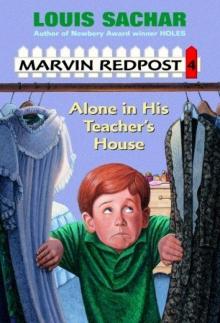 Alone in His Teacher's House
Alone in His Teacher's House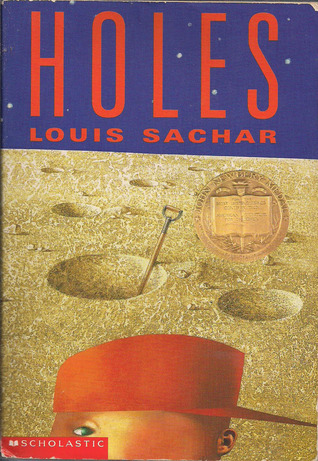 Holes
Holes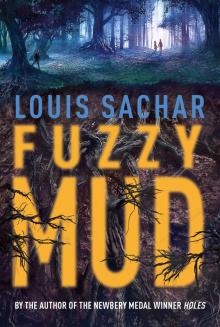 Fuzzy Mud
Fuzzy Mud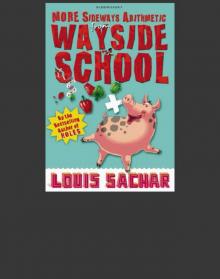 More Sideways Arithmetic From Wayside School
More Sideways Arithmetic From Wayside School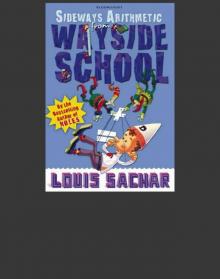 Sideways Arithmetic From Wayside School
Sideways Arithmetic From Wayside School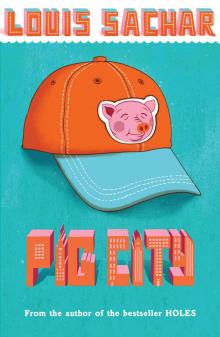 Pig City
Pig City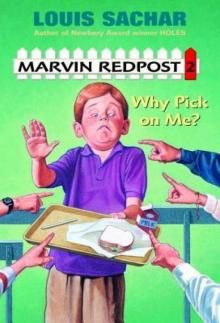 Why Pick on Me?
Why Pick on Me? The Boy Who Lost His Face
The Boy Who Lost His Face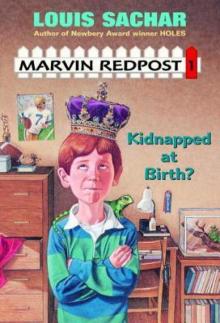 Kidnapped at Birth?
Kidnapped at Birth? There's a Boy in the Girls' Bathroom
There's a Boy in the Girls' Bathroom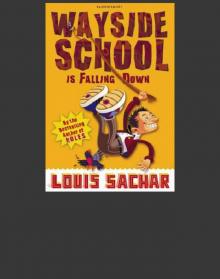 Wayside School Is Falling Down
Wayside School Is Falling Down Stanley Yelnats' Survival Guide to Camp Green Lake
Stanley Yelnats' Survival Guide to Camp Green Lake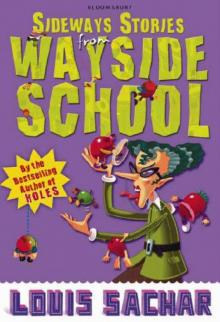 Sideways Stories from Wayside School
Sideways Stories from Wayside School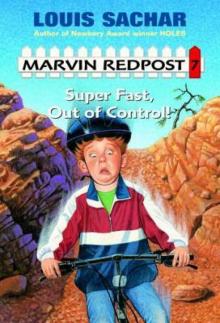 Super Fast, Out of Control!
Super Fast, Out of Control!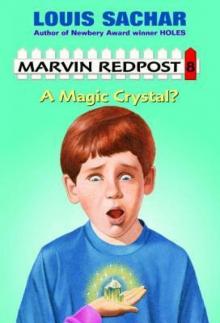 A Magic Crystal?
A Magic Crystal?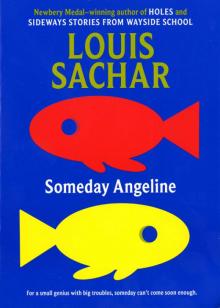 Someday Angeline
Someday Angeline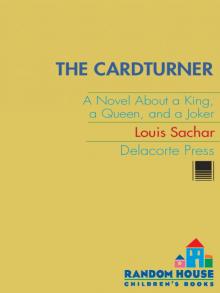 The Cardturner: A Novel About Imperfect Partners and Infinite Possibilities
The Cardturner: A Novel About Imperfect Partners and Infinite Possibilities A Flying Birthday Cake?
A Flying Birthday Cake?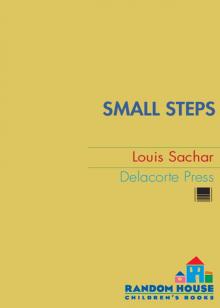 Small Steps
Small Steps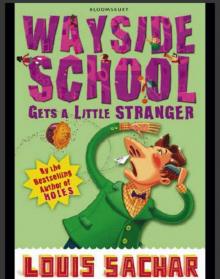 Wayside School Gets a Little Stranger
Wayside School Gets a Little Stranger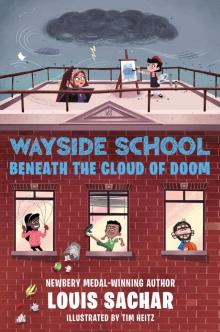 Wayside School Beneath the Cloud of Doom
Wayside School Beneath the Cloud of Doom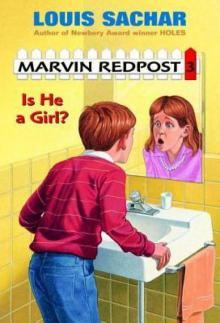 Is He a Girl?
Is He a Girl? Dogs Don't Tell Jokes
Dogs Don't Tell Jokes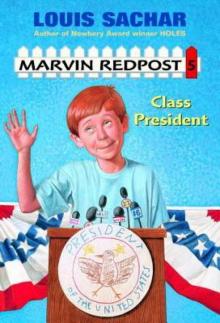 Class President
Class President Kidnapped at Birth
Kidnapped at Birth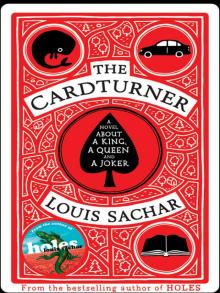 The Cardturner
The Cardturner Stanley Yelnats' Survival Guide to Camp Greenlake
Stanley Yelnats' Survival Guide to Camp Greenlake